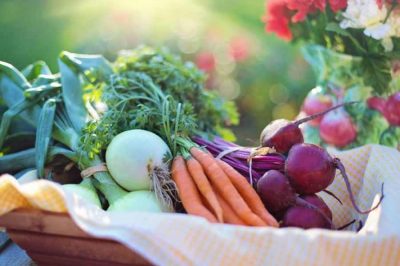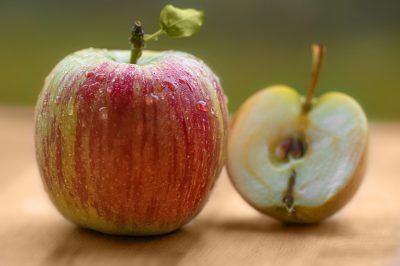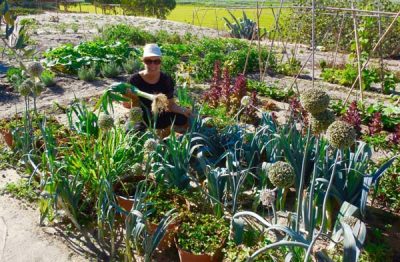Fighting Fit For Autumn

Autumn is officially here and the harvest moon at the start of this season was particularly breathtaking. It’s time, therefore, to delight in the flavours of autumn cooking and learn how to create delicious dishes using the fruits and vegetables of the season. Learn how to apply the Eastern wisdom about autumn in your own cooking for optimum health, nourishment and vitality.
Before I get to that however, I wanted to share with you what an incredible month September has been. Bill and I have been full on with book signings at events, filming with a fantastic t.v. production company in London, giving presentations to yoga studios with my Ahimsa message and veganism and thrilled to be gaining some momentum.
The love of my work teaching Macrobiotics and the principles of yin and yang are always reminding me that the only permanence in life is impermanence. In nature, autumn reflects dryness: when the leaves lose their moisture, they shrivel up and ‘let go’ of the branches they have hung onto since springtime. It is, therefore, the time to reflect on the past year and to prepare to withdraw as the winter months close in.
The life-giving light of the spring and the summer begins to wane, and the vigorous energy of those seasons come to an end.
THERE IS A BEAUTIFUL SADNESS TO AUTUMN.
As temperatures fall and the evenings draw in, our motivation to exercise is less apparent. It is important though to stretch out the muscles of the body and get plenty of exercise. Breath is your life!
Seasonal cooking is the best way to safeguard your ‘chi’ (energy)
Finding out the best autumn foods to support and strengthen the body sets you up for the colder months of winter. Seasonal cooking is the best way to safeguard your ‘chi’ (energy).
The recipes and teas below all use vegetables that are in abundance during this season and support the lungs and large intestine, so be sure to incorporate these foods into your autumn meals.
This is a perfect time to start making some wonderful probiotics to keep you in tip-top condition over the winter months. Fermented vegetables are the perfect food to replenish the good bacteria in your gut and support your immune system. It's good to remind ourselves that we are in fact 90% bacteria.
Nine out of every ten cells in our bodies are not human but belong to these microbial species (most of them residents of our gut). So what exactly are the 500 or so distinct species and countless different strains of those species that make up the kilogram or so of microbes in our gut doing there?
For most of these microbes, their survival depends on our own, and so they do all sorts of things to keep their host (us), alive and well.
Perhaps their most important function is to maintain the health of the gut wall, or epithelium. In the course of a lifetime, 60 tons of food pass through the gastrointestinal tract, yikes!!
Taken as a whole, the organisms in the gut constitute the largest and one of the human body’s most important organs of defence. So why would the body enlist bacteria in all these critical functions, rather than evolve its own systems to do this work? One theory is that because microbes can evolve rapidly they can respond with much greater speed and agility to changes in the environment.
Though we tend to think of bacteria as agents of destruction, they are invaluable creators as well. Gut bugs manufacture essential vitamins (including vitamin K as well as several B vitamins) and a great many other compounds scientists are only just beginning to recognize.
Overly-processed foods typical of Western diets don’t contain enough fibre to sustain our gut bacteria – unlike probiotic foods such as pickled vegetables, miso and other fermented food. The lack of fibre in our diet is, in effect, starving our gut and its microbial residents. We have changed the human diet in such a way that it no longer feeds the
whole superorganism, as it were, only our human selves. We’re eating for one when we need to be eating for a few trillion.
FERMENTED VEGETABLES AND HEALTHY BACTERIA
It makes sense therefore that the more healthy bacteria you eat, the more you crowd out the bad guys, and it’s so simple to make some fermented dishes in your own kitchen. The case for eating live-culture foods seems strong, perhaps strongest for fermented vegetables. In addition to bringing large numbers of probiotic guests to your gut, the vegetables themselves also supply plenty of prebiotics – nourishment for the bacteria already there (fibre).
You can choose from an array of beautifully coloured vegetables to ferment but cabbage, carrots and cucumber are the ones I use most.
The salt and water solution (known as brine) is used to protect against the growth of microorganisms that would lead to rotting and promote the growth of the good bacteria, ‘lactobacilli.’ It’s important to use the correct ratio of salt to water, otherwise the fermentation process won’t happen (filtered water please). A good rule of thumb is 4 cups of water for 2 tablespoons of sea salt.
As you will know, Lacto-fermented vegetables are cultured vegetables. You’ve probably heard of sauerkraut, kimchi, and sour dill pickles. These are all forms of lacto-fermentation. Making your own lacto-fermented vegetables is so easy that once you start you’ll be hooked! Sour, salty and crunchy these pickles are delicious added to beans and grain dishes or salads, and we have a serving or two daily from the many different pickles I make. Traditionally, lacto-fermentation was used to preserve the harvest and store vegetables for the winter.
If you have a garden full of cabbage, cauliflower, beetroots, carrots, and green beans and don’t know how to store them all, consider making a few batches of lacto-fermented vegetables. These can be stored in your refrigerator for months.
If you are dealing with multiple allergies, chances are your gut is out of balance and needs a daily dose of beneficial microorganisms. These crispy, sour, salty vegetables are highly addicting and an easy, economical way to maintain a healthy gut. These vegetables are also important to include daily for good health.
AUTUMN MISO BROTH
This basic miso soup should be a daily staple of your diet. It encompasses the use of sea vegetables to mineralize the blood, and a variety of fresh vegetables. The balance of these ingredients creates strengthening energy, vital to life.
Miso is a fermented soybean paste used to flavour various dishes, but it is most widely as a stock to season soups. Miso’s natural fermentation process creates a combination of enzymes that strengthen and nourish the intestinal tract. As a result, the blood that nourishes the balance of the body is much stronger. The quality of our blood creates the people we are and the health we possess. Miso has been used for centuries in the East as a remedy for cancer, weak digestion, low libido, several types of intestinal infections, high cholesterol, and so much more and is one of the world’s most medicinal foods.
Ingredients
2 dried shiitake mushrooms
1 tsp. wakame flakes
2 finely diced spring onions
4 rounded tsp. miso paste
Freshly grated ginger juice
Diced spring onion for garnish
Instructions:
Soak the wakame and shiitake mushrooms in two cups of water for 20 minutes. Remove from the water and cut the mushrooms into small dice, removing the stems as they can be bitter tasting. Place in a soup pot and add another 4 or 5 cups of water. Bring to a boil and then cook on a low simmer for 5 minutes. Add the spring onions and cook 5 minutes. Place the miso paste into a small mesh strainer and lower into the broth. Using a spoon, stir until the paste is dissolved. Serve as is or add some cooked noodles. Garnish with finely diced spring onions and a slice of lemon.
Tip: do not boil the miso – it has so many living microorganisms living inside which is a wonderful digestive tonic.
AUTUMN ROASTED VEGETABLES
Autumn and winter vegetables such as parsnips, turnips, leeks, beetroots, and squash greatly benefit from slow roasting, which concentrates their earthy sweetness; bake these vegetables in the oven with your choice of herbs.
- Assorted vegetables, such as pumpkin, butternut squash, shallots, onions, garlic, parsnips, beetroots, carrots, or rutabaga
- Fresh herbs, such as thyme or sage, chopped
- Salt and freshly ground black pepper
- Balsamic vinegar
Preheat oven to 180C/360F. Peel and seed vegetables as necessary or, if small and tender enough, simply trim and scrub well.
Coarsely cut into pieces of approximately equal size. Transfer to a large bowl and add a tablespoon of balsamic vinegar, sea salt and ground black pepper. Transfer to a large baking pan, lined with parchment paper. Scatter herbs on top. Season to taste again with a little more salt and pepper if desired. Roast vegetables, turning occasionally, until golden on the edges and tender when pierced with a knife. Add a splash or two of water to the roasting tin now and again to keep the vegetables from drying out.
MARLENE’S KITCHEN PHARMACY: AUTUMN TIPS
Eating steamed greens daily – seasoned with some freshly grated ginger juice and sesame seeds – is a powerful dish that keeps the lungs strong.
Thank you as always for supporting our work to bring a world of peace for all who live here, humans and nonhumans alike. My latest book Go Vegan is available worldwide on amazon. The book is filled with 85 delicious recipes each with stunning photography and educational material that will change your life to one of health and longevity. The foreword to my book is written by my dear friend. T. Colin Campbell, author The China Study.
Have a happy and healthy autumn.
In good health
Vegans found to have highest amount of disease-fighting biomarkers

The proof is in the pudding so to speak. Our friend and esteemed colleague Dr. Tim Radak just shared with me this recent publication from the Adventist Health study shining a very positive light on vegans and gaining a lot of coverage. Dr. Radak's Chair for his dissertation was one of the researchers. This comes as no surprise to those of us who have been singing from the same page for decades. I therefore, repeat the heading as I smile widely.
Humans Have No Need To Consume Animal Products
"A vegan diet was found to produce the healthiest levels of diet-related biomarkers compared to other diet patterns, according to a Loma Linda University study. The study was reported last month in The Journal of Nutrition."
Dr. Radak has a masters and doctorate in Public Health Nutrition from the leading university for vegetarian science and nutrition, the CEPH accredited Loma Linda University,is a Registered Dietitian Nutritionist and has worked in the nonprofit sector and academia for over 20 years, authored or co-authored articles related to plant-based diets in peer-reviewed scientific journals, written several plant-based and vegetarian textbook chapters, and is passionate about helping the public discover the link between good health and plant-based diets.
We are thrilled that Dr. Radak will be presenting with us at our next event at Queen Mary University, London early Spring.
The ideas that drive the vegan approach to living are not new. For the centuries since the times of Pythagoras, thousands of thoughtful people have questioned the use of animals for food. Those concerns have usually been moral considerations about killing sentient life, but concerns for health and our relationship with nature have been considered as well. As winner of the Nobel Prize Albert Einstein said, “Nothing will benefit human health and increase chances of survival for life on earth as much as the evolution of a vegetarian diet.” That evolution has arrived, and it is veganism.
Famous people who stopped eating animals include Leonardo da Vinci, Leo Tolstoy, and two other Nobel Prize winners – George Bernard Shaw and Isaac Bashevis Singer. You don’t have to be a Nobel Prize winner to get the message. In present times the sensibility of a vegan diet has spread out into the arts and athletics. The number of professional athletes who have switched to a vegan approach to eating include swimmers, skiers, weightlifters and those in team sports, and include multiple modern Olympians. There is rumour that the word ‘vegan’ comes from the Latin word vegetus, meaning ‘strength of mind and body’. Who really knows? Based on the evidence, it sounds right to me.
My latest book, Go Vegan available world-wide on amazon is filled with educational material and 85 delicious easy recipes each with a beautiful photograph for you to replicate. Please join us in service for a healthy world for humans and nonhumans alike.
In good health
Humans Have no Need to Consume Animal Products to be Healthy

Here's a useful list of links to use when it is claimed to the contrary. Remember, knowledge is power.
A vegan diet contains only plants (such as grains, beans, vegetables, nuts, seeds and fruits). Vegans do not eat foods that come from animals, including dairy products and eggs.
Healthy eating as a vegan
You can get all of the nutrients you need from eating a varied and balanced vegan diet. The NHS need to update their information in terms of their infancy recommendations. A vegan diet is completely healthy from birth to old age. They also recommend lots of oils for omega 3 sources. Nuts, seeds etc., are a far healthier choice. https://www.nhs.uk/live-well/eat-well/the-vegan-diet/
The Permanente Journal:"Healthy eating may be best achieved with a plant-based diet, which we define as a regimen that encourages whole, plant-based foods and discourages meats, dairy products, and eggs as well as all refined and processed foods. We present a case study as an example of the potential health benefits of such a diet. Research shows that plant-based diets are cost-effective, low-risk interventions that may lower body mass index, blood pressure, HbA1C, and cholesterol levels. They may also reduce the number of medications needed to treat chronic diseases and lower ischemic heart disease mortality rates. Physicians should consider recommending a plant-based diet to all their patients, especially those with high blood pressure, diabetes, cardiovascular disease, or obesity."
http://www.andjrnl.org/article/S2212-2672(16)31192-3/abstract
Dietitians Association of Australia:“Vegan diets are a type of vegetarian diet, where only plant-based foods are eaten. They differ to other vegetarian diets in that no animal products are consumed or used. Despite these restrictions, with good planning it is still possible to obtain all the nutrients required for good health on a vegan diet.”
http://daa.asn.au/.../smart.../nutrition-a-z/vegan-diets/
Academy of Nutrition and Dietetics:“It is the position of the Academy of Nutrition and Dietetics that appropriately planned vegetarian, including vegan, diets are healthful, nutritionally adequate, and may provide health benefits for the prevention and treatment of certain diseases. These diets are appropriate for all stages of the life cycle, including pregnancy, lactation, infancy, childhood, adolescence, older adulthood, and for athletes.”
http://www.ncbi.nlm.nih.gov/pubmed/19562864
British Dietetic Association:“Well-planned vegetarian diets can be both nutritious and healthy. They have been associated with lower risks of heart disease, type 2 diabetes, obesity, certain types of cancer and lower blood cholesterol levels.”
www.bda.uk.com/foodfacts/vegetarianfoodfacts.pdf
Dietitians of Canada:“A healthy vegan diet has many health benefits including lower rates of obesity, heart disease, high blood pressure, high blood cholesterol, type 2 diabetes and certain types of cancer.”
https://www.unlockfood.ca/en/Articles/Vegetarian-and-Vegan-Diets/What-You-Need-to-Know-About-Following-a-Vegan-Eati.aspx?fbclid=IwAR3lqzG5gjgIVMS6A21Y9z1fnS3NSdvkXOiquyZT36y6u9kexkOXTroxaRQ
Harvard School of Public Health:“Nowadays, plant-based eating is recognized as not only nutritionally sufficient but also to reduce the risk for many chronic illnesses.”
http://www.health.harvard.edu/staying-healthy/becoming-a-vegetarian
Cleveland Clinic:“There really are no disadvantages to an herbivorous diet! A plant-based diet has many health benefits, including lowering the risk for heart disease, hypertension, Type 2 diabetes, and cancer. It can also help lower cholesterol and blood pressure levels, plus maintain weight and bone health.”
http://my.clevelandclinic.org/health/articles/understanding-vegetarianism-heart-health...
New York Presbyterian Hospital: “People who follow a vegetarian diet are relatively healthier than those who don't. Vegetarians tend to have a lower incidence of obesity and fewer chronic health problems, including some cancers, heart disease, high blood pressure, and diabetes.”
http://nyp.org/wellness/showDocument.php?contentTypeId=1…
The Ronald Reagan UCLA Medical Center (UCLA):“Some of the health benefits of a vegetarian diet may include: [decreased blood cholesterol levels and blood pressure; [l]ower incidence of heart disease, some forms of cancer, and digestive disorders like constipation and diverticula disease; [l]ower incidence of obesity and some forms of diabetes.”
http://www.dining.ucla.edu/housing_site/dining/SNAC_pdf/Vegetarianism.pdf
The Mayo Clinic:“A well-planned vegetarian diet can meet the needs of people of all ages, including children, teenagers, and pregnant or breast-feeding women. The key is to be aware of your nutritional needs so that you plan a diet that meets them.”
http://www.mayoclinic.com/health/vegetarian-diet/HQ01596
Nutrition Facts:"These are the top 15 causes of death, and a plant based diet can prevent nearly all of them, can help treat more than half of them, and in some cases, even reverse the progression of disease, including our top three killers."
http://nutritionfacts.org/video/uprooting-the-leading-causes-of-death/
Walter Willet, the Chair of Harvard nutrition department, writes:
“Humans have no nutritional requirement for animal milk, an evolutionarily recent addition to the diet,” Willett and his co-author, David Ludwig, of Boston Children’s Hospital, wrote in an article published last September in the journal, JAMA Pediatrics.''
''… the recommendation for three servings of milk per day is not justified and is likely to cause harm to some people. The primary justification is bone health and reduction of fractures. However, prospective studies and randomized trials have consistently shown no relation between milk intake and risk of fractures. On the other hand, many studies have shown a relation between high milk intake and risk of fatal or metastatic prostate cancer, and this can be explained by the fact that milk intake increases blood levels of IGF-1, a growth-promoting hormone.''
http://life.nationalpost.com/.../drinking-milk-not.../
NHS - UK - A vegan diet contains only plants (such as vegetables, grains, nuts and fruits) and foods made from plants. Vegans do not eat foods that come from animals, including dairy products and eggs. Healthy eating as a vegan - You can get most of the nutrients you need from eating a varied and balanced vegan diet.
https://www.nhs.uk/live-well/eat-well/the-vegan-diet/
Nutrition Facts: "These are the top 15 causes of death, and a plant based diet can prevent nearly all of them, can help treat more than half of them, and in some cases, even reverse the progression of disease, including our top three killers."
http://nutritionfacts.org/video/uprooting-the-leading-causes-of-death/
In good health
DHA Supplement Is Not Required

We are still swimming in the sea of confusion about nutrition on a plant-based vegan diet. Do we need supplements? What about DHA? There has been so much fear mongering over the past months about supplementing with DHA - Docosahexaenoic acid is an omega-3 fatty acid that is a primary structural component of the human brain, cerebral cortex, skin, and retina.
In physiological literature, it is given the name 22:6. It can be synthesized from alpha-linolenic acid or obtained directly from maternal milk, fish oil, or algae oil.
This is the best and most honest presentation I have found that Bill and I 100% support. Please watch the video from our good friend Dr. Tim Radak it will answer every question you may have about supplementing with DHA.
We obtain all we need from plants. The only supplement we require is B12. You can also obtain B12 from fortified foods such as nutrition yeast.
Vitamin B12, also called "cobalamin," is one of the eight water-soluble vitamins that play a key role in the metabolism of every cell in the human body, and is especially important in the normal functioning of the brain and nervous system, and the formation of red blood cells.
Only bacteria have the enzymes needed for the synthesis of various forms of Vitamin B12. No fungi, plants, or animals can make vitamin B12. However, animal tissues significantly store vitamin B12, which is made from bacteria that they have consumed. This is the reason that meat, poultry, eggs, fish, and dairy foods are recommended sources of B12 in people's diets. Those of us who follow a vegan diet (no animal foods) are often told we must eat animal foods or risk developing deficiency of this essential vitamin. This is absolute nonsense. Bill and I see countless clients who are big meat eaters with B12 deficiencies.
Fortunately, we live in a world naturally populated with trillions of B12-producing bacteria. Plus our mouth and large intestine are very large reservoirs of B12-synthesizing bacteria. The various sources of bacteria in our environments supply sufficient amounts for most people, and as a result, actual cases of vitamin B12 deficiency disease due to lack of sufficient oral intake are very rare.
Following a delicious, diverse whole food plant based vegan diet is the way to go for optimal health. You will find 85 recipes in my latest book Go Vegan available world-wide on amazon or in bookstores. All my recipes have the perfect balance of omega 3 and omega 6 ratio. Hydrate, exercise, eat plants, get some sun, go vegan and enjoy life.
In good health




